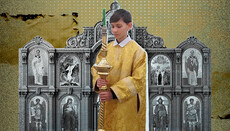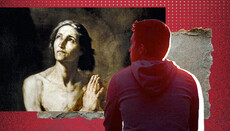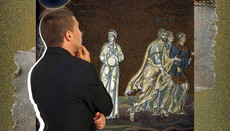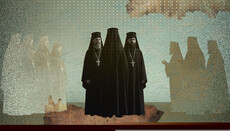The Pharisee and the tax collector as the two poles of spiritual warfare
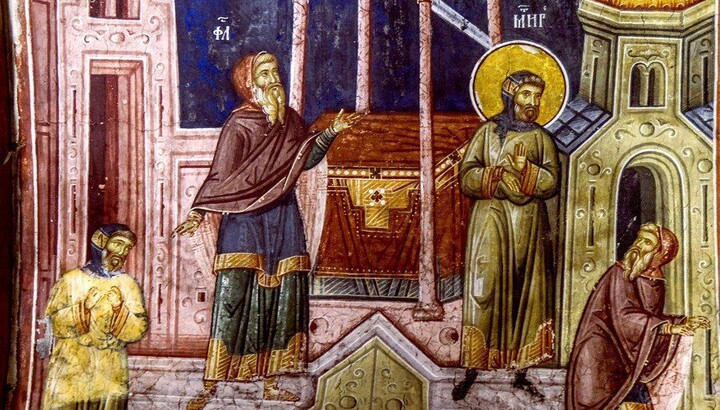
Sunday Sermon.
The parable of the tax collector and the Pharisee outlines two extreme points on the spectrum of spiritual warfare. It begins from the depths of pride, arrogance, and self-importance, gradually ascending to the heights of humility, simplicity, and the "spiritual poverty" that leads a person into the Kingdom of Heaven. At each stage, this struggle has its own specifics, battle conditions, tactics, and strategy. But if we look at this battlefield from above, we will see the following picture.
A human being is organised in such a way that he/she can receive life from only one source – from God. Life is given to the spirit, which fills the soul, and in turn, the body is nourished by the soul. The break of this chain occurred at the point where God connects with the human spirit. That is why the dead bury their dead (Matt. 8:22), and most people have little concern about the state of their dead soul. Sin has become a valve that blocks the access of life-giving Divine energy to our soul.
The destructive effect of sin on a person is such that we cannot even speak of the possibility of the soul’s "healing", though this term is frequently used in Orthodox asceticism.
It would be more accurate to use the word "rebirth". Our old self is hopelessly dead – it can only be scraped away, torn off from the soul, and only then can a new self be born from above in its place. This is why the Apostle Paul writes to the Corinthians that the inner person is renewed as much as the outer person decays (2 Cor. 4:16).
To undergo this transformation, one must study the anatomy of the soul. If sin is the result of a fatal illness, then what is its cause? The cause lies in the action of passion, and even earlier – in the initial sinful impulse, which the Holy Fathers call a passionate thought. Hence, no matter what we do to our outward man, no matter how much we fast, no matter how much we give alms, etc., these efforts will have no effect unless they are coupled with an inner work.
Within us is the soul, whose eye is its mind, while its irrational energetic elements on which the mind sits are the will and feelings. However, it would be more correct to use the patristic terminology: the "desirous" and "irascible" parts of the soul. The rebirth of a person consists in the prior sanctification of the mind and the subsequent transformation of these two passionate beginnings, which now spontaneously lead our personality. In its dead state, a person is like a ship without a helmsman, unconditionally subject to his lower energies that fully control reason.
God addresses the human mind with His Word, which became flesh so that we might receive His seed within us.
Under the influence of faith, our mind will change (repent) and subsequently transform what is under the power of the irrational forces of the soul. Some religious traditions understand dispassion as the complete suppression of feelings and wishes. This is the Stoic ideal, which observes the storms of life with indifference, casting an anchor of detachment into the sea.
The word "passion" comes from the Greek "pathos", meaning strong feeling. However, it should not be forgotten that passion can be either good or evil. There can be a powerful hatred of evil and an equally powerful love for God. Passion, in general, is a natural energy of the soul, which currently lives in us contrary to God's law. A malfunction has occurred; the movement of passion’s energy has changed. Therefore, the task of a Christian is not to shut down this energy but to redirect it properly.
After accepting faith with the mind and agreeing to live according to God's will, the most challenging task is to tame the irrational, passionate part of the soul. How can it be transformed from a wildly galloping stallion to an obedient domestic horse? It takes a lot of time, patience and labour to achieve this. External preparation is also necessary. This includes all aspects of the formal side of ascetic life: abstinence, regulation and quality of food intake, moderate sleep, avoidance of idle talk, judgment, and so on. This aspect of spiritual warfare is marked by a "negative" sign, i.e. what must be renounced or cut off. Such actions will somewhat exhaust the energy of the wild horse. But without a "positive" component, without nourishing the soul properly, such exercises will be mere self-torture and nothing more.
Unfortunately, the inner side of spiritual warfare, which provides positive nourishment, is our weakest point.
Many completely neglect it, thereby rendering all their external efforts meaningless. The necessary "positive" element in spiritual warfare is what the Holy Fathers call mindfulness, inner discipline of thought, or, in other words, sobriety. This is the very essence of our battle – without it, we are doomed to failure.
The thought energy of the mind has the property of an unceasingly flowing stream. Typically, this stream flows through filth. It must be redirected into the right course and filter out its dirty waters. The primary filter for this process is the Jesus Prayer, which at first will be the so-called labour prayer – an effort required of all Orthodox Christians. Sobriety is the continuous control of emotional background and mental activity. If the gauge swings towards negativity, it must be immediately redirected in the opposite direction. The most important and difficult part of mind-heart work is vigilant attention to the flow of thoughts. The skill of cutting off enemy thoughts, timely parrying their attacks, and guarding the heart as it is called by the Holy Fathers is the highest art of spiritual warfare, which we need to master for the final victory over the devil. The Jesus Prayer plays a crucial, key role in this battle.
If, therefore, one engages in this inner work methodically, without unnecessary haste or breaks, calmly and systematically, the soul will begin to change imperceptibly for the ascetic himself. The rotten fragments of the old self will painfully fall away, while in their place, fragrant fruits of another world will grow, manifesting themselves in the gifts of the Holy Spirit.
